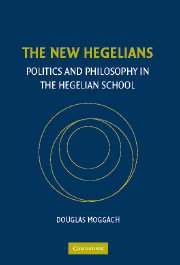Book contents
- Frontmatter
- Contents
- Acknowledgements
- Contributors
- Introduction: Hegelianism, Republicanism, and Modernity
- 1 Eduard Gans on Poverty and on the Constitutional Debate
- 2 Ludwig Feuerbach's Critique of Religion and the End of Moral Philosophy
- 3 The Symbolic Dimension and the Politics of Left Hegelianism
- 4 Exclusiveness and Political Universalism in Bruno Bauer
- 5 Republican Rigorism and Emancipation in Bruno Bauer
- 6 Edgar Bauer and the Origins of the Theory of Terrorism
- 7 Ein Menschenleben: Hegel and Stirner
- 8 ‘The State and I’: Max Stirner's Anarchism
- 9 Engels and the Invention of the Catastrophist Conception of the Industrial Revolution
- 10 The Basis of the State in the Marx of 1842
- 11 Marx and Feuerbachian Essence: Returning to the Question of ‘Human Essence’ in Historical Materialism
- 12 Freedom and the ‘Realm of Necessity’
- 13 Work, Language, and Community: A Response to Hegel's Critics
- Bibliography
- Index
11 - Marx and Feuerbachian Essence: Returning to the Question of ‘Human Essence’ in Historical Materialism
Published online by Cambridge University Press: 22 August 2009
- Frontmatter
- Contents
- Acknowledgements
- Contributors
- Introduction: Hegelianism, Republicanism, and Modernity
- 1 Eduard Gans on Poverty and on the Constitutional Debate
- 2 Ludwig Feuerbach's Critique of Religion and the End of Moral Philosophy
- 3 The Symbolic Dimension and the Politics of Left Hegelianism
- 4 Exclusiveness and Political Universalism in Bruno Bauer
- 5 Republican Rigorism and Emancipation in Bruno Bauer
- 6 Edgar Bauer and the Origins of the Theory of Terrorism
- 7 Ein Menschenleben: Hegel and Stirner
- 8 ‘The State and I’: Max Stirner's Anarchism
- 9 Engels and the Invention of the Catastrophist Conception of the Industrial Revolution
- 10 The Basis of the State in the Marx of 1842
- 11 Marx and Feuerbachian Essence: Returning to the Question of ‘Human Essence’ in Historical Materialism
- 12 Freedom and the ‘Realm of Necessity’
- 13 Work, Language, and Community: A Response to Hegel's Critics
- Bibliography
- Index
Summary
This paper is part of a larger effort to present what I would call the “unsaid” – or some of what is “unsaid” – in Karl Marx's theory. By this I am referring to a certain philosophical background made up of presuppositions that are not always completely explicit. This is not an attempt to expose “what Marxism really is,” because I believe there is no such thing in the absolutely univocal sense. Instead, I am attempting to view Marx in another light, principally in regard to the self-representation that Marxism has built up for itself – to view it, in fact, from the basis of a given spirit of (our) time, at the beginning of a new century. I do not presume that a theory can exist without philosophical presuppositions or commitments. The point here is to try to avoid being naïve regarding the presuppositions that may be assumed even when seeking to approach Marx's theory in a renewed and anti-dogmatic manner.
Particularly in this paper, I want to show a certain permanence, re-elaboration, and consequent “strengthening” in Marx's critical theory of 1845–6, of the originally Feuerbachian notion of a “communitarian” essence of man – with all the weight that this notion of essence has, among other things, for the definition of concepts like alienation. The Marxian re-elaboration of the Feuerbachian notion of “species-essence” (Gattungswesen) occurs primarily in Marx's well-known “Theses on Feuerbach,” and the first section, “Feuerbach,” of the German Ideology (a collaborative work by Marx and Engels).
- Type
- Chapter
- Information
- The New HegeliansPolitics and Philosophy in the Hegelian School, pp. 242 - 260Publisher: Cambridge University PressPrint publication year: 2006
- 1
- Cited by



